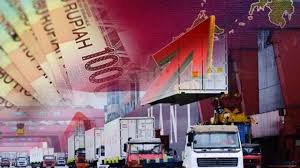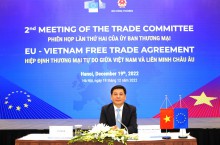The News
Indonesia's non-tariff measures and other trade regulations
Indonesia is one of the countries that applies many trade barriers to Vietnamese goods in the ASEAN region (after Thailand) such as regulation 27/2015 of the Indonesian Ministry of Information and Communications on the localization rate with mobile phones and tablets, regulation 65/2020 of the Indonesian Ministry of Commerce on the use of ships and Indonesian insurance in rice imports and coal exports, regulation 55/2016 of the Indonesian Ministry of Agriculture on quarantine with products containing fresh plant origin… and many trade remedy cases applied by the Indonesian Ministry of Trade.
Indonesia is one of the countries that applies many trade barriers to Vietnamese goods in the ASEAN region (after Thailand) such as regulation 27/2015 of the Indonesian Ministry of Information and Communications on the localization rate with mobile phones and tablets, regulation 65/2020 of the Indonesian Ministry of Commerce on the use of ships and Indonesian insurance in rice imports and coal exports, regulation 55/2016 of the Indonesian Ministry of Agriculture on quarantine with products containing fresh plant origin… and many trade remedy cases applied by the Indonesian Ministry of Trade.
Indonesia is one of the countries that applies many trade barriers to Vietnamese goods in the ASEAN region (after Thailand) such as regulation 27/2015 of the Indonesian Ministry of Information and Communications on the localization rate with mobile phones and tablets, regulation 65/2020 of the Indonesian Ministry of Commerce on the use of ships and Indonesian insurance in rice imports and coal exports, regulation 55/2016 of the Indonesian Ministry of Agriculture on quarantine with products containing fresh plant origin… and many trade remedy cases applied by the Indonesian Ministry of Trade.

- For agricultural products and products with plant origin, before being exported to Indonesia, they must comply with the following regulations:
In case of being exported from a country that has recognized by Indonesia's Food Safety Control System: Before the product is put on the means of transport for export, the enterprise must make "pre-notification" about the shipment through the official website of the Indonesian Agricultural Quarantine Agency (IAQA) http://www/karantina.deptan.go.id or go directly to the website http://notice.karantina.peitanian.go.id.
In case of being exported from a country that has not been recognized by Indonesia's Food Safety Control System but has a testing laboratory accredited by Indonesia: Before exporting, enterprises must make "Pre-Notification" about the consignment of goods through the official website of the Indonesian Agricultural Quarantine Agency (IAQA) http://www/karantina.deptan.go.id or go directly to the website http://notice.karantina.pertaniango.id and must have a Certificate of Analysis (CoA) attached to each export shipment.
In particular, the CoA must be issued by a testing laboratory that is registered with IAQA and recognized by IAQA. The CoA must contain complete information about the product, the owner of the product, product properties, date of testing, test methods, analysis results and certification of compliance with food safety requirements of Indonesia.
- For boneless meat:
According to the Indonesian Ministry of Agriculture, businesses wishing to export boneless meat to Indonesia need an animal health certificate, a quarantine certificate and a Halal certificate issued by the competent authority of Indonesia. Before Indonesian state-owned enterprises import boneless meat, they must apply for an introduction from the Indonesian Ministry of Agriculture and an import license issued by the Ministry of Trade.
Imported products must be stored in refrigerators, when distributed for consumption, it is necessary to specify the time of use to ensure the health of consumers.
- For meat products:
For meat products, before importing and exporting, it is necessary to have a certificate of the local quarantine agency (for import) and the quarantine agency of the exporting country (for export). Halal standard certification must be issued by the competent authorities.
- Import license: Importers of products with plant origin must obtain a letter of introduction from the Indonesian Ministry of Agriculture and send it to the Indonesian Ministry of Trade for an import license. The importation of the above-mentioned commodities is registered at certain times before, during or after the harvest season. Particularly, the import of chili and onions for local consumption is regulated separately, based on the reference price of the Indonesian Ministry of Trade.
Products are classified into four categories: (i) import of fresh products for consumption; (ii) import of fresh products for production materials; (iii) import of finished products for consumption; (iv) import of finished products to use as raw materials for production.
- Labels, packaging: Labels written in Bahasa Indonesia is mandatory for all goods. Except for words with no Indonesian translation. The labeling of 'Halal' is regulated by two ministries: the Ministry of Health and the Ministry of Religion. Labels of food products must ensure the following elements: registered products and product codes (ML codes) issued by the Food and Drug Administration; expiry date; Indonesian language; full names and addresses of importers. If it is a Halal product, it must have a certificate from an agency authorized by the Indonesian Islamic Council.



